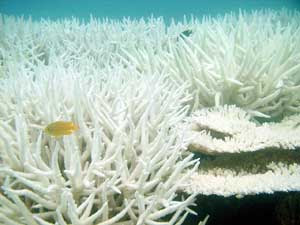
Please comment DIRECTLY on this posting.
a. What oceanic region of the world do you think is currently susceptible to coral bleaching? Why so?
b. Is there anything that humans can do to prevent coral bleaching? Explain/describe.
After you respond, check out the following article and see how your thoughts match those of the current studies being conducted on corals!
http://www.sciencedaily.com/releases/2009/07/090725120003.htm
I would guess that the Caribbean is the area most susceptible to coral bleaching because it has a large population of coral. It is also very close to the equator, which means that it is getting large amounts of UV rays and a lot of sunlight to heat the water. Also, there are many tourists that could be causing the bleaching to worsen at a higher rate because of pollution in the water.
ReplyDeleteHumans can help decrease the amount of pollution in the environment. The rays of sun would not be as strong on the coral if we had a cleaner environment that wasn’t causing negative effects. The problem of coral bleaching would be nonexistent if the environment wasn’t being destroyed so rapidly. Humans could really help with this problem if they could eliminate global warming, however, this is an unrealistic idea. The best way to help would be to minimize the amount of fuels emitted and to clean up land whenever possible.
Shallow, warm waters are most susceptible to coral bleaching. These could be the waters along the equator. I think this because of the fact that sunlight only penetrates a certain depth into the water. So it would have to be very warm where coral bleaching is. Coral bleaching occurs by many things, including cold shock, decrease in salinity, UV exposure, increased water temperature, turbidity, and pollution.
ReplyDeleteHumans can definitely help to prevent coral bleaching. There should be certain restrictions on areas where there are problems and not let people dive, fish, or do anything that could harm the coral even more. After reading the article, I saw that I was right in how to help out. The article says that, ““Possible responses include mobilizing monitoring resources to measure extent and impact of bleaching, and establishing temporary restrictions on other reef uses like diving, boating and recreational fishing, to keep these activities from adding to the stress of higher sea temperatures already affecting the coral reefs.”
In the article it said, “In parts of the eastern Caribbean, as much as 90 percent of corals bleached and over half of those died during that event." I couldn’t believe that this was such a problem. It really put into perspective how big of a problem coral bleaching is.
I would assume that Caribbean and equatorial bodies of water would be the most susceptible to the process of coral bleaching due to the highest UV exposure, and more shallow seas throughout coral reefs. The shallower and more exposed regions would be more likely to face higher water temperatures that interrupt coral's symbiotic relationship.
ReplyDeleteThere is most certainly ways for humans to prevent and help with the issue of coral bleaching. For one, people can cut down on their carbon emissions as this raises the global temperature to a degree (no pun intended) and thus raises the temperature of oceanic waters and disturbs the symbiotic relationship between coral and zooxanthellae. Without the zooxanthellae, the coral will lose pigment and die, better known as coral bleaching. If awareness is raised of how much simple everyday things can affect places like the great barrier reef and other marine ecosystems, then I think that people can work to prevent coral bleaching.
Coral bleaching has been commonly found in climates with high temperature. The article noted that coral bleaching has happened in Central Gulf of Mexico, Hispaniola, and the Caribbean. The pacific ocean or the Atlantic ocean is most susceptible. They are most susceptible because they are closest to the equator where temperatures are high. When temperatures are high it causes UV expulsion. The UV rays emitting from the sun burn the algae.
ReplyDeleteYes, humans can prevent coral bleaching by stopping certain activities that can protect coral. The article names events such as fishing, diving, and boating can help. Also we can keep a close watch on coral to aware us before coral bleaching occurs.